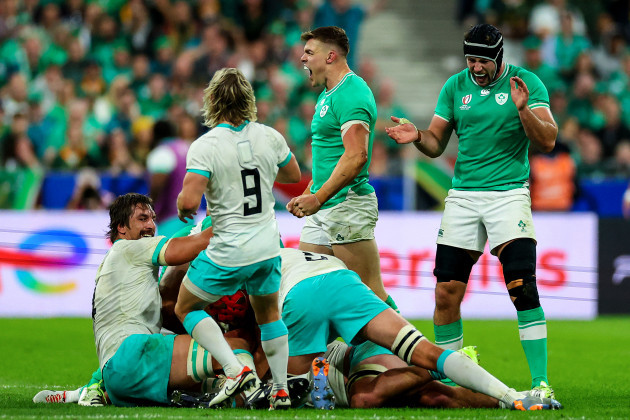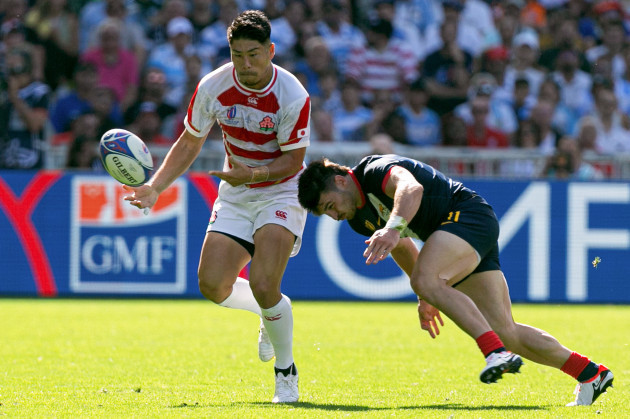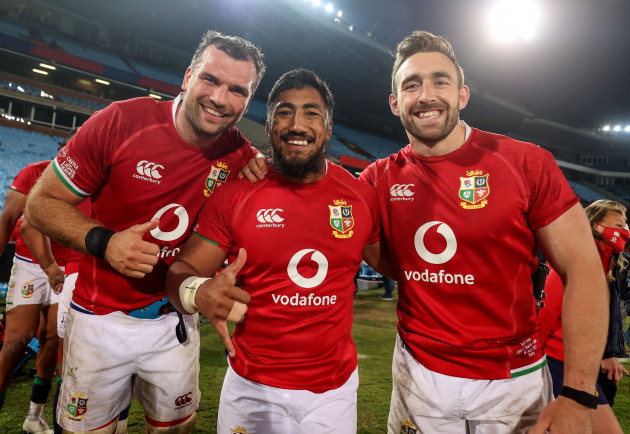THE NEW ERA of international rugby is set to begin in 2026.
World Rugby finally confirmed today that the long-mooted and much-discussed Nations Championship will launch in 2026, with two divisions of 12 teams but no promotion/relegation until 2030.
The competition will be played on a biennial basis, so in 2026, 2028, 2030, 2032, and so on.
That means it will not be played in World Cup years or in years when there is a British and Irish Lions tour.
The top division of the Nations Championship will be made up of the Six Nations sides – Ireland, France, England, Scotland, Wales, and Italy – as well as the SANZAAR nations – New Zealand, South Africa, Argentina, and Australia – and two more teams to be invited by SANZAAR. Japan and Fiji are firm favourites for those slots.
Six Nations and SANZAAR will run the top division of the Nations Championship, while World Rugby will run the second division of 12 teams.
That second tier will be made up of 12 so-called ‘performance nations’ such as Portugal, Georgia, Samoa, Tonga, Spain, Uruguay, USA, Romania, and Chile, but there has been no official confirmation by World Rugby on the line-up yet.
The Nations Championship will take place across both the July and November Test windows. It does not include the Six Nations or the Rugby Championship, which remain completely separate and distinct competitions.
What will the Nations Championships actually look like? Before we go any further, we should highlight that some aspects of this new competition still have to be copperfastened, signed and sealed, but this piece explains the concept.
So, let’s use the example of Ireland in 2026. This is a hypothetical scenario, given that no fixtures or schedules have been confirmed yet.
In July 2026, Ireland will still travel away from home but they will no longer visit one nation for a three-Test tour as has previously been the case. Many fans will miss tours like Ireland’s three-Test visit to New Zealand last year.
Instead, Ireland will play three different nations away from home in the July 2026 window. Their three opponents will be from the ‘SANZAAR Conference’ made up of New Zealand, South Africa, Argentina, Australia, Fiji, and Japan [presuming the last two are confirmed].
For example, that could see Ireland play Australia in Australia one weekend, New Zealand in New Zealand the next weekend, then Japan in Japan on the third weekend of their tour.
The format means that each of New Zealand, South Africa, Argentina, Australia, Fiji, and Japan would host three home games in the July window.
Then in November 2026, Ireland will host the three other ‘SANZAAR Conference’ nations in Ireland. So they could face South Africa on the first weekend, then welcome Argentina, and face Fiji at home on the third weekend.
Again, the format means that Ireland, France, England, Scotland, Wales, and Italy will all host at least three home games in the November window.
All of those six fixtures across the two competition windows will leave Ireland with a certain position in the ‘European Conference’ table, which also includes France, England, Scotland, Wales, and Italy.
The two top teams from the European and SANZAAR Conferences will then take part in a final on the fourth weekend of the November window, while the second-placed sides from each conference will play off, the third-placed teams will clash, and so on in order to decide the finishing positions of the 2026 Nations Championship.
So if Ireland were top of their European Conference after their six games, they would play the Nations Championship final against the top team from the SANZAAR Conference. For example, New Zealand.
That final would definitely take place in the Northern Hemisphere, where all the teams would be located for that window, and presumably in Dublin, but World Rugby has not officially confirmed exactly how hosting rights would be decided.
Adding in this fourth official weekend to the November window means it has to be chopped out somewhere else in the calendar. So from 2026, the Six Nations will only include one rest weekend, rather than the current two.
World Rugby insists that it has been working closely with International Rugby Players, the global union for professional players, to ensure player workloads will be managed more stringently than ever.
The second division of the Nations Championship will mirror the top division in format, which World Rugby says will mean regular, reliable competition for the ‘performance nations,’ some of whom have lacked that.
The format will be the same in 2028 but the third edition of the competition in 2030 will bring with it the spectre of promotion and relegation.
The team that wins the second division in 2030 will be promoted into the top division for 2032, while the nation that finishes last in the top division in 2030 will be relegated to the second division for the 2032 competition.
Why wait so long to start this process?
World Rugby says it’s a “compromise” given that some of the top unions didn’t want promotion and relegation involved at all.
So what happens in between the Nations Championship years?
In 2027, it will be the Rugby World Cup. The same will be true in 2031 and 2035 and so on.
In 2029, there will be a Lions tour, with the same again in 2033, 2037, and so on.
Of course, the Lions years still see national teams playing international games in July.
For example, Ireland will travel for games in July 2029 while the Lions tour is ongoing.
World Rugby has stated that the internationals in the years between the Nations Championship will involve a 50% increase in ‘crossover’ games between the sides from the top division and sides from the second division.
In old money, that means they’re promising 50% more chances for ‘Tier 2′ teams to play against ‘Tier 1′ teams in non-Nations Championship years, therefore aiding their development.
However, World Rugby has admitted that no agreements have been signed in this regard, with “more work to be done,” according to CEO Alan Gilpin. So it remains to be seen whether this transpires as promised.
World Rugby is convinced the Nations Championship will bring far more revenue into the game through the sale of broadcasting rights.
Until now, the unions have essentially been selling the rights for ‘friendly’ games in July and November, whereas they believe this biennial competition with a winner lifting a trophy will have far greater commercial appeal.
There is a worry that the richest unions will only get richer with the new competition, particularly given that Six Nations and SANZAAR themselves will run the top division, but World Rugby insists that won’t be the case.
“The suggestion this makes the rich richer are misplaced because this is about creating a better landscape,” said Gilpin. “This is an opportunity to grow the pie as a whole, rather than grow the same pie for a few.”
The vote to get the Nations Championship across the line took place in Paris this morning. The top unions essentially have the strongest voting power, with some of the smaller nations not even having any say.
World Rugby chairman Bill Beaumont admitted there were “a few dissenters” in the room but insisted there had been “a two-thirds majority” in favour.
Clearly, not everyone is happy with what’s coming down the line, but after more than 15 years of discussing this concept, the wheels are finally in motion.
“Is it perfect? Probably not,” said World Rugby’s Gilpin.
“Is it a hell of a lot better than the current situation? Absolutely.”
– Updated 8.19pm: An earlier version of this article incorrectly stated that the Nations Championship will be played on a bi-annual basis; it will be played on a biennial basis.




